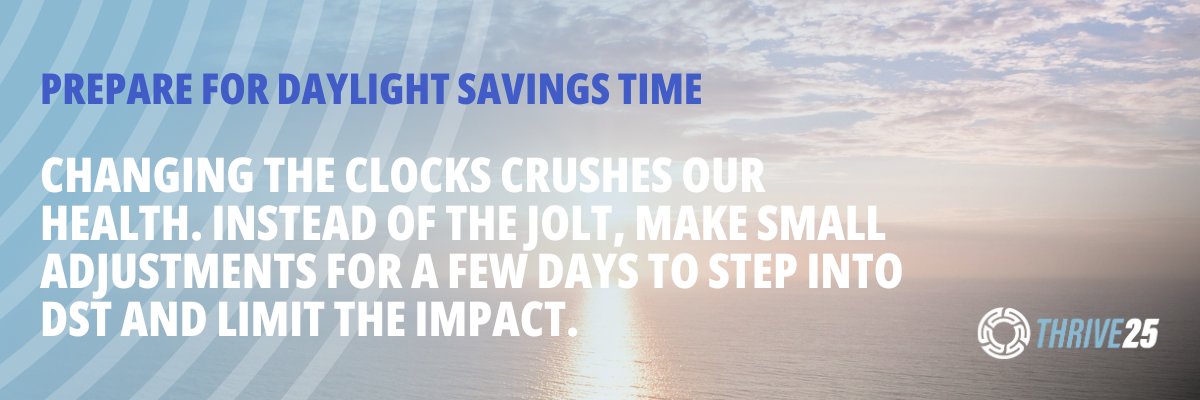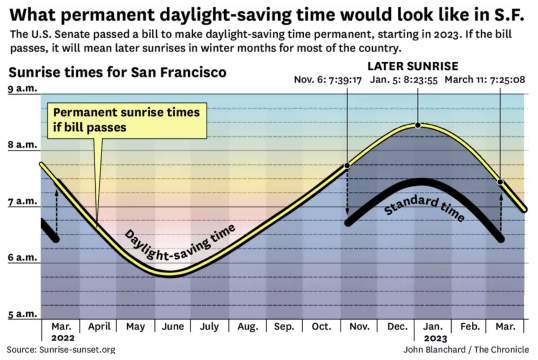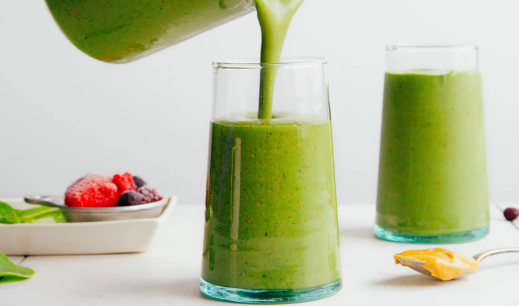Issue #313: Daylight Savings 🤦♂️
Good morning. It’s Thursday, March 7th.
Stat of the Day
The number of countries that currently follow daylight savings time (DST). Over 140 have used DST for at least one year. (Source)
Learn
Oh Daylight Savings
Here we go again - time to “spring forward” and lose out on an hour of sleep this weekend.
I’ll be honest - when I was a kid growing up in Ohio (pretty far west in the Eastern Time Zone) I absolutely loved the summers when it was still light out past 9pm.
Now I can’t stand it being so dark in the morning and losing that hour on Sunday.
But it’s not just a personal preference one way or another - changing the clocks crushes our health.
Daylight Savings Time (DST) isn’t good. Think that one hour doesn’t matter - traffic accidents go up 6% for the week after DST. It’s especially true in the morning.
Makes sense - AAA found that the risk of traffic accidents doubles if you get less than 7 hours of sleep and doubles again if you get less than 5 hours of sleep. Your reaction time is literally the same as when you’re legally drunk.
This matters because car accidents are still a top 10 cause of death.
But it’s not just being tired - DST also contribute to mental health issues like depression and increases the number of heart attacks by 24%.
Modern DST was invented by New Zealand entomologist George Hudson in an 1895 paper (not Benjamin Franklin in 1784, despite many references - he was only making a joke about candles to the French!). But as change often does, it actually started halfway around the world in Canada in 1908. DST went in and out of favor between WWI and WWII, but it’s been active in the U.S. since 1942 - in practice for reasons that range from farming to energy conservation - when lights were a high percentage of energy use and costs.
But all the science suggests that it just doesn’t make sense to change the time. When you think about it - it doesn’t make sense at all.
There’s a normal cycle of daylight throughout the year - shorter days in the winter and longer in the summer, right? Changing the clocks the way we do actually makes this change BIGGER. Instead of naturally cycling with the sun a couple minutes each day, we get jolted forward and back by an hour 2x per year via the only time machine we’ve created, a clock.
It makes no sense to increase the variance we’re already experiencing. If anything, we should almost reverse the season we jump forward and backward to make it more consistent throughout the year.
Stop Changing the Clock
Congress introduced the Sunshine Protection Act to move to DST 12 months a year. Again, the 12-year old in me would be jumping up and down - but we should align time with when society wakes up and optimize our morning with the sun.
Just look at what will happen in San Francisco - no sun until 8:20am in January.
So science says stick with Standard time.
But since we don’t make the rules - all we can do is adjust the best we can.
Try
Start Tonight
Our 4 Step Process to make DST less painful*:
Go to bed a little earlier the next 3 nights (10-15 min each night) so that you’re close to the right schedule by Saturday night.
Change the clock on Saturday night and wake up at your normal time on Sunday.
Jumpstart your day with loads of early morning sunshine (as soon as you can get it since it’ll probably be dark when you wake up and double down on doing what it takes to wake up - get moving (25 push-ups anyone?), go for a cold plunge, spend as much time outside as possible.
Finally - adjust your meals to the new time and go to bed at the time like you never changed the clocks.
Easier said than done - but give it a try, we don’t need any extra car crashes this year.
* These actions are not just contained to DST - they are useful for any travel across time zones
Thrive25 Partner Spotlight
Want more valuable nutrients?
Magnesium is a master mineral - we covered the benefits of Magnesium in Issue #21. The only form that gets into the brain is Magnesium Threonate (MgT).
The Momentous Magnesium Threonate supplement is clinically proven to improve cognitive function and enhance the quality of sleep (see video from Dr. Andrew Huberman at minute 2:19). So it’s become part of my personal supplement routine.
Thrive25 subscribers get 15% off the entire product portfolio using code Thrive at checkout. Click HERE!
Eat
Spinach
Spinach is packed with vitamins and minerals, including vitamin A, C, K1, iron, calcium, and fiber. It's also a good source of magnesium and several B vitamins. But it’s not always a crowd favorite when it comes to taste.
Also, some people might have trouble with raw spinach - it does have oxalates. These salts bind to minerals so they can’t get absorbed by our body and sometimes cause digestive issues. If you’ve got kidney issues - then I’d say go for a different veggie - like Brussels Sprouts or asparagus.
If you feel off after eating spinach - you can steam or boil it to reduce the oxalates. Also, if you eat spinach be sure to drink a ton of filtered water and maybe add some lemon to help get rid of these unwanted additions to Popeye’s favorite food.
Health Benefits
Eye Health: spinach is high in zeaxanthin and lutein, which are beneficial for your vision
Bone Health: spinach is rich in calcium and vitamin K, critical for bone health.
Blood Health: the iron in spinach is crucial for creating hemoglobin that carries oxygen in the blood
Inflammation: spinach contains antioxidants that combat oxidative stress and reduce the risk of chronic diseases
How to Eat
Serving size: 1 cup of raw spinach or ½ cup cooked. Like most fruits and vegetables, a handful roughly equals a serving
Pairing: spinach is great with foods high in vitamin C (citrus fruits, bell peppers) to enhance iron absorption and diary to get more of that calcium
Types: go with baby spinach in your salad/smoothie, it’s better for raw consumption, and mature spinach when you’re cooking
Antioxidant paradox: see above. Oxalates lead to oxidative stress. Individuals with kidney issues should moderate their intake
Cook
Quick Green Smoothie
Here’s the easiest way I can think of to get some spinach - the ultimate vegan green smoothie. A blend of banana (potassium), peanut butter (fat & some protein), spinach (see above), flaxseed (omega-3), blueberries (antioxidants), and almond milk - just about everything you need. Maybe add some protein if it’s after a workout.
In the News
Healing in the Digital Age: Imagine - no more challenges with poor scheduling systems or waiting rooms with outdated magazines. Or a cure for cancer? Check out how AI, VR/AR, 3D-printing and more are shaping the healthcare industry of the future. (Source)
Don’t hit snooze: While it’s so easy just to hit snooze, drifting in and out of sleep for a few extra minutes can have a negative effect on our mental health. (Headspace)
The Great Chain of Being: Metaphors like the Great Chain of Being can lead people to misunderstand evolution and humanity’s place in a hierarchy of life. That misconception continues to paint people's view of evolution. However, all species share a common lineage with all other life on Earth, a truth best represented by a web of life. (Big Think)
Thanks for joining us today!
Check out the latest workout videos on our YouTube channel
Got feedback, recommendations or stories to share? Tell us what’s on your mind here
Want this direct to your inbox? Sign up here
Why Thrive25
We’re 40-something dads that felt our bodies and minds start to slow down and we’re not ready for that. We found too much information on every subject. So we started Thrive25 to transform what we’ve learned into something useful for the rest of us to spend just 3-5 min a day to optimize our health & longevity.
This newsletter is for you and we truly value your feedback. Never hesitate to reach out to us at team@thrive25.com.
To health!
Sign up for free:
The information in this newsletter is for informational purposes only and may not be appropriate or applicable based on your individual circumstances. Thrive25, Inc. does not provide medical, professional, or licensed advice. Please connect with your healthcare professional for medical advice specific to your health needs.










